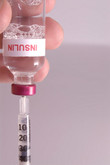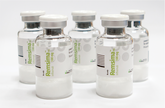Biosimilars
FDA debuts purple book for biologicals and interchangeable biosimilars
On 9 September 2014, the US Food and Drug Administration (FDA) announced the publication of its first-ever edition of the ‘Purple Book’, a new set of lists of licensed biological products and interchangeable biosimilars that is meant to be the biological equivalent of the ‘Orange Book’, which lists pharmaceuticals and their generic equivalents.
European approval for biosimilar insulin
Partners Eli Lilly and Boehringer Ingelheim, announced on 10 September 2014 that they had received European Commission (EC) approval for its biosimilar insulin glargine product Abasria (LY2963016), a first for Europe.
Adalimumab biosimilar has comparable pharmacokinetics to Humira
An adalimumab biosimilar (CHS-1420) from fledgling biotech company Coherus Biosciences (Coherus) has shown comparable pharmacokinetics in a pivotal clinical study.
FDA accepts applications for three-times-weekly follow-on Copaxone
The US Food and Drug Administration (FDA) has accepted applications submitted by generics makers Dr Reddy’s, Sandoz (Momenta Pharmaceuticals’ development and commercialization partner), and Mylan for three-times-weekly follow-on versions of blockbuster multiple sclerosis drug Copaxone (glatiramer acetate).
Infliximab biosimilar to be distributed by Mundipharma
Celltrion’s infliximab biosimilar Remsima will be distributed in Belgium, Germany, Italy, Luxembourg, The Netherlands and UK, exclusively by Mundipharma International and its independent associated companies. Remsima is a biosimilar of Johnson and Johnson (J&J) and Merck’s anti-inflammatory blockbuster Remicade (infliximab).
US senators call for guidance on biosimilars
A growing number of US senators are calling on the country’s Department of Health and Human Services (HHS) and Food and Drug Administration (FDA) to release guidance on key scientific policy questions related to biosimilars.
The future of biosimilar use and regulation in Latin America
There is a growing uptake of biosimilars in Latin America, but this has not been accompanied by an increase in pharmacovigilance, training or regulation. To address this, an expert panel was put together to discuss the issues involved. The panel’s perspectives on the current status led to six major recommendations drawn up to enhance the safe use of biosimilars across the region [1].
Physicians believe biosimilars should have different names
In the ongoing debate over how to name biosimilars, US physicians have now added their opinion to the discussion.
FDA receives application for monoclonal antibody biosimilar
South Korean biotechnology company Celltrion announced on 11 August 2014 that the company had, on 8 August 2014, completed the filing procedure to obtain US Food and Drug Administration (FDA) approval for its infliximab biosimilar.
FDA grants tentative approval for insulin treatment
On 18 August 2014, the US Food and Drug Administration (FDA) granted tentative approval for a new insulin glargine product (LY2963016).












